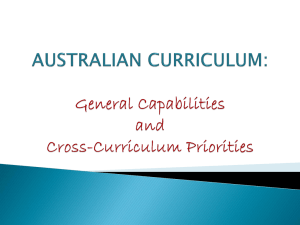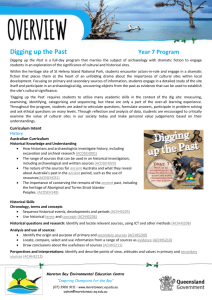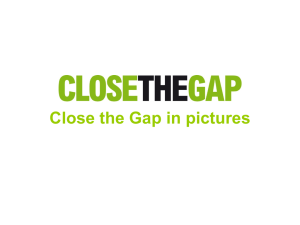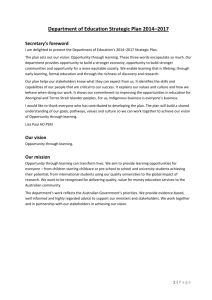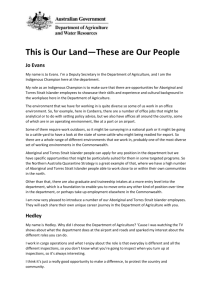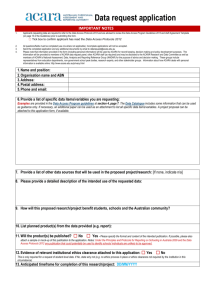ACARA Languages update – November 2013
advertisement
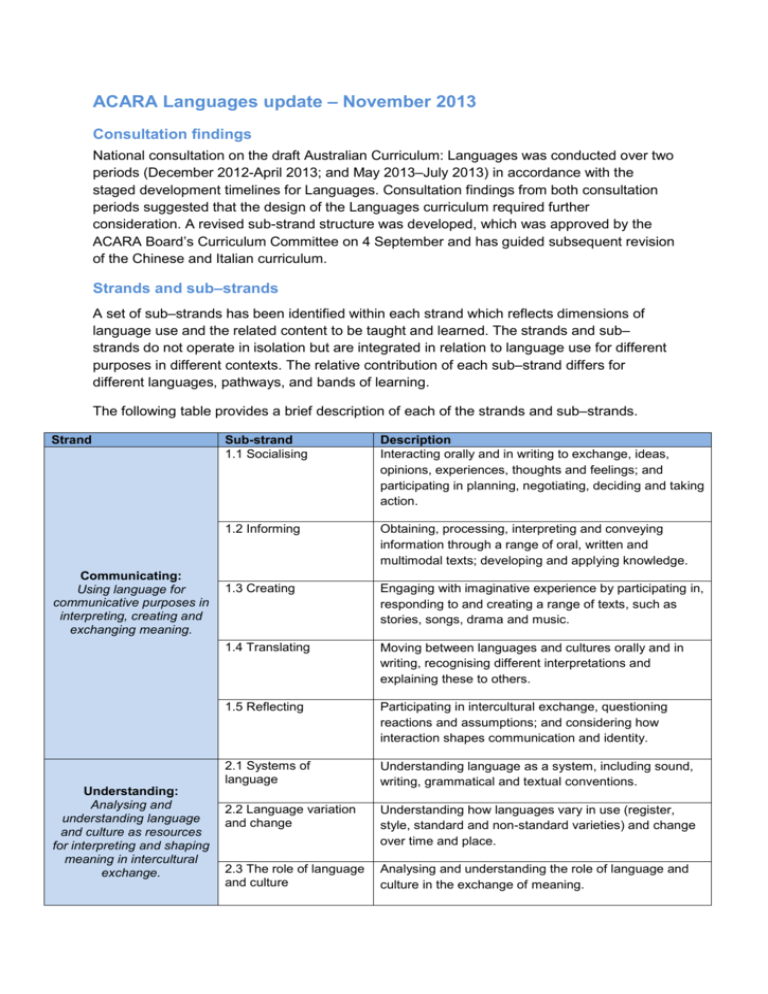
ACARA Languages update – November 2013 Consultation findings National consultation on the draft Australian Curriculum: Languages was conducted over two periods (December 2012-April 2013; and May 2013–July 2013) in accordance with the staged development timelines for Languages. Consultation findings from both consultation periods suggested that the design of the Languages curriculum required further consideration. A revised sub-strand structure was developed, which was approved by the ACARA Board’s Curriculum Committee on 4 September and has guided subsequent revision of the Chinese and Italian curriculum. Strands and sub–strands A set of sub–strands has been identified within each strand which reflects dimensions of language use and the related content to be taught and learned. The strands and sub– strands do not operate in isolation but are integrated in relation to language use for different purposes in different contexts. The relative contribution of each sub–strand differs for different languages, pathways, and bands of learning. The following table provides a brief description of each of the strands and sub–strands. Strand Communicating: Using language for communicative purposes in interpreting, creating and exchanging meaning. Understanding: Analysing and understanding language and culture as resources for interpreting and shaping meaning in intercultural exchange. Sub-strand 1.1 Socialising Description Interacting orally and in writing to exchange, ideas, opinions, experiences, thoughts and feelings; and participating in planning, negotiating, deciding and taking action. 1.2 Informing Obtaining, processing, interpreting and conveying information through a range of oral, written and multimodal texts; developing and applying knowledge. 1.3 Creating Engaging with imaginative experience by participating in, responding to and creating a range of texts, such as stories, songs, drama and music. 1.4 Translating Moving between languages and cultures orally and in writing, recognising different interpretations and explaining these to others. 1.5 Reflecting Participating in intercultural exchange, questioning reactions and assumptions; and considering how interaction shapes communication and identity. 2.1 Systems of language Understanding language as a system, including sound, writing, grammatical and textual conventions. 2.2 Language variation and change Understanding how languages vary in use (register, style, standard and non-standard varieties) and change over time and place. 2.3 The role of language and culture Analysing and understanding the role of language and culture in the exchange of meaning. Framework for Aboriginal Languages and Torres Strait Islander Languages The Foundation to Year 10 Draft Framework for Aboriginal Languages and Torres Strait Islander Languages was released for public consultation from 19 May 2013 through to 25 July 2013. A series of community consultation forums was held in all states and territories from 28 May to 30 July 2013 to supplement online consultation on the draft Framework. Two hundred and forty people participated in the community consultation forums representing over 80 Aboriginal languages and Torres Strait Islander languages. The recognition of Aboriginal Languages and Torres Strait Islander Languages within a national Australian Curriculum was considered by all as symbolic and emblematic. There was strong endorsement of the framework approach as inclusive of all Aboriginal and Torres Strait Islander Languages, and strong support for the development of three learner pathways. Key directions for revision have been developed, and pending approval by the ACARA Board, will be used to revise the Framework for Aboriginal Languages and Torres Strait Islander Languages in accordance with consultation feedback. Developmental Timelines The revised Chinese and Italian curriculum documents will be published on the ACARA website for public viewing until 22 November 2013. While this is not a formal consultation process, comments on the revised documents are welcome. The final Australian Curriculum: Languages Foundation to Year 10 for Chinese and Italian will be presented to the ACARA Board in December 2013. Following Board and Ministerial approval the curriculum will be published on the Australian Curriculum website in early 2014. Revision of the draft curriculum for Arabic, French, German, Indonesian, Japanese, Korean, Modern Greek, Vietnamese and Spanish, will be undertaken according to a staged timeline, beginning from late 2013. Following publication of the language-specific curricula in 2014, ACARA will begin working with select schools and teachers in all states and territories to collect work samples, for Chinese and Italian, in the first instance. Work samples portfolios are designed to assist teachers in interpreting the achievement standards and comprise a collection of annotated student work illustrating evidence of student learning in relation to the Achievement Standard.
